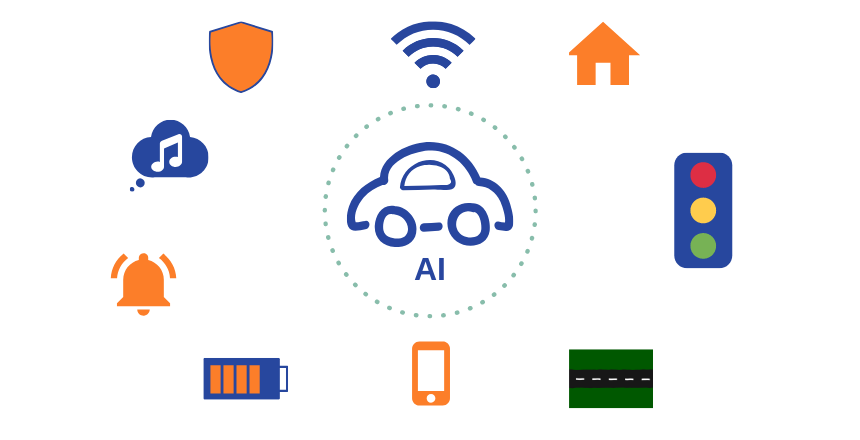Artificial Intelligence and Machine Learning applications are transforming several sectors. Few months ago, we’ve published an article with insights gained from McKinsey study of Automobile after-market in 2030 and another article that talks of a need for NLI implementations like Cox’s Nexi virtual assistant for Automotive dealers. AI and ML applications in the automotive industry spans across the supply-chain and after-market services.
According to the study of marketsandmarkets.com, AI in the automotive industry is valued at USD 565.2 Million in 2016 is expected to reach USD 10,573.3 Million by 2025, at a CAGR of 38.46% during the forecast period.
While the possible AI and ML applications in the automotive industry is too exhaustive to list here, nevertheless, we highlight a few that seems to have caught the imagination of Auto execs:
- AI in assisting drivers: The artificial intelligence technology can help drivers from preventing accidents through AI-based automatic sensors. AI-based vehicles have advanced features to assist drivers. For example, the sensors mounted on the dashboard can observe the eye gaze, head position, eyesight, and way of driving and alert drivers to ensure safe driving.
- Autonomous vehicles: The autonomous vehicles are driver-less. In the coming future, there is a huge demand for autonomous vehicles. Tesla is one of the companies investing in autonomous vehicles. The eCommerce industry is projected to immensely benefit from autonomous vehicles by reducing the costs of their Logistics.
AI-powered vehicles can help customers in fore-warning potential breakdowns, like, battery or lights etc.. by monitoring the vehicle lights, battery status through sensors. Through these sensors, the AI-powered vehicles can also suggest a preventive maintenance schedule for the vehicle.
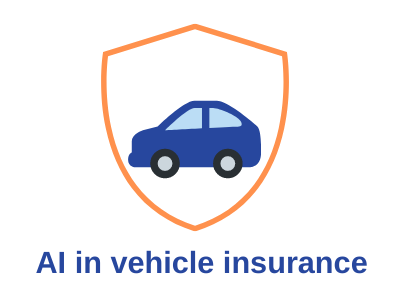 Claiming insurance for the vehicle in case of accidents is a time-consuming process in most of the countries. Using AI (image identification and classification models), it is possible to estimate the damages objectively and thereby, reducing the time taken to process the insurance claims. Further, AI models can predict driver risk in real-time by analyzing past risk factors and previous actions.
Claiming insurance for the vehicle in case of accidents is a time-consuming process in most of the countries. Using AI (image identification and classification models), it is possible to estimate the damages objectively and thereby, reducing the time taken to process the insurance claims. Further, AI models can predict driver risk in real-time by analyzing past risk factors and previous actions.
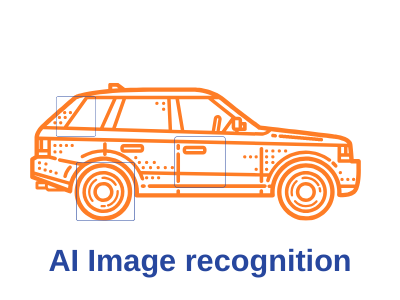 One of the new applications of AI in manufacturing is in Quality control/ assurance. In the vehicle manufacturing process, identifying the defective parts is of paramount importance so as to ensure Quality of the final product (vehicle). In the traditional QC/QA, defective parts are manually identified and separated from the output produced. Manual identification is a time-consuming process and is prone to human errors and thereby, effects the quality of the final product. To overcome these problems, AI (using visual/image recognition models trained on several thousands of images of these parts) can easily identify the defective parts, thereby ensuring both quality and reducing costs.
One of the new applications of AI in manufacturing is in Quality control/ assurance. In the vehicle manufacturing process, identifying the defective parts is of paramount importance so as to ensure Quality of the final product (vehicle). In the traditional QC/QA, defective parts are manually identified and separated from the output produced. Manual identification is a time-consuming process and is prone to human errors and thereby, effects the quality of the final product. To overcome these problems, AI (using visual/image recognition models trained on several thousands of images of these parts) can easily identify the defective parts, thereby ensuring both quality and reducing costs.
Further, predictive analytics can help in identifying the patterns in the manufacturing process that is resulting in these defects.
The ML models that are trained on image recognition of vehicle parts and predictive analytics of defective parts provides greater value to the automotive manufacturing process and thereby, increases the quality and safety of automotive vehicles.
Supply chain optimization is a laborious process for automotive dealers because predicting demand and planning for supply, optimizing sales price and identifying right PoS locations is a time-consuming process. AI’s predictive analytics can optimize the supply chain by providing accurate analysis of demand, supply, sales price, and targeted locations data.
Nowadays the vehicles are connected to smart intelligent devices like a smartphone. The vehicles use WiFi connections to upload and download multi-media for in-vehicle entertainment. In the near future, these smart devices can include personal assistant, voice assistant, and predictive vehicle maintenance.
Further, automotive vehicles could be connected to smart home, smart city, route navigation, entertainment, internet access, and roadside assistance.
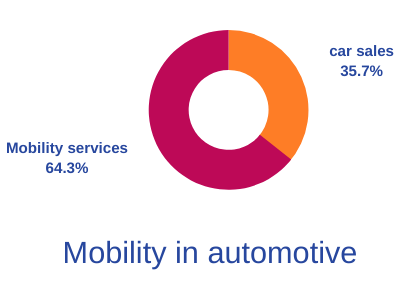 The automotive industry is going to transform massively with mobility based transportation solutions, like Uber or Ola etc.., which ultimately might effect car ownership. In the near future, car ownership is projected to replace mobility services. So according to the new emerging trends, the automobile industry has to redesign their way of doing business.
The automotive industry is going to transform massively with mobility based transportation solutions, like Uber or Ola etc.., which ultimately might effect car ownership. In the near future, car ownership is projected to replace mobility services. So according to the new emerging trends, the automobile industry has to redesign their way of doing business.
Smart mobility services provide pricing based on the customer vehicle travel distance or mileage. This means the customers can adjust their transportation costs according to their individual needs.
According to the recent research study of Accenture, the profits from car sales will even shrink slightly from €126 billion to €122 billion and revenues from mobility services are projected to soar to almost €1.2 trillion with profits reaching as much as €220 billion.
While a certain level of automation could be achieved with a smart mobility solutions, nevertheless, AI could further enhance the quality and scale of automation through predictive analytics, which includes custom pricing based on the customer preferences derived from the historical data.
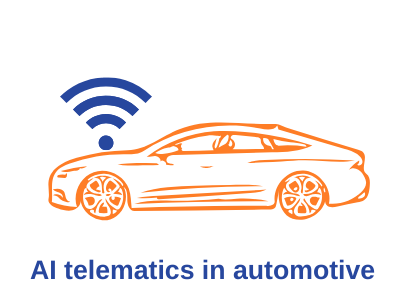 Telematics is the process of monitoring the vehicle. It monitors all the activities of the vehicle like car location, how fast the vehicle driving etc..
Telematics is the process of monitoring the vehicle. It monitors all the activities of the vehicle like car location, how fast the vehicle driving etc..
AI can analyze the data of customer driving behavior and provide insights to improve customer driving performance. Further, an AI-powered vehicle can provide information on accident alerts, facial recognition, drowsy driving alert, distracted driving alert, accident prediction and safe distance warning etc..

